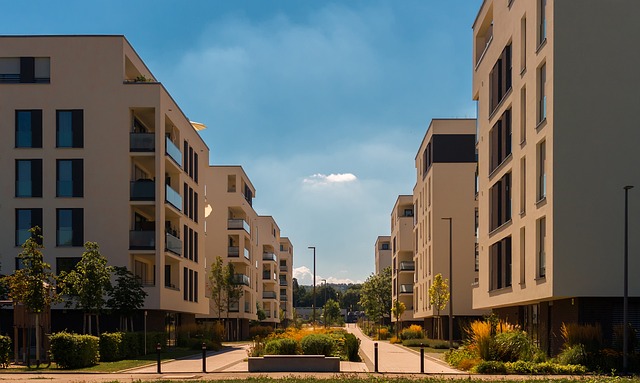The ec price Singapore reflects a complex interplay of factors including location, development size, unit type, age, and government policies. Unlike resale flats, Executive Condominiums (ECs) offer a middle ground between public and private housing, appealing to both first-time homeowners and upgraders. New EC launches can initially lower prices due to competition but may increase later as inventory dwindles. EC prices are influenced by market dynamics such as demand and supply, economic trends, and population growth. Government policies, including those on tobacco harm reduction for Electronic Cigarettes (ECs), also impact pricing. Developers use a data-driven approach to set competitive prices that balance attractiveness with profitability. The EC market is expected to remain dynamic with potential for growth, making it a compelling investment within Singapore's property ecosystem. For those interested in the ec price Singapore, staying informed on all these factors is crucial for understanding and navigating the market effectively.
navigating the nuances of real estate investment in Singapore, understanding the pricing dynamics of Executive Condominiums (ECs) is paramount. This article delves into the multifaceted aspects of EC price trends in Singapore, providing a comprehensive analysis from historical patterns to future projections. From the influence of government policies and market demand to the strategies developers employ when setting prices for new launches, readers will gain insights into the factors that shape the EC price landscape in Singapore. Whether you’re a potential homeowner or an investor, the intricacies of EC pricing within this vibrant housing market are crucial for informed decision-making. Ec Price Singapore.
- Understanding EC (Executive Condominium) Pricing in Singapore: An Overview
- Factors Influencing EC Prices in Singapore's Real Estate Market
- Historical Price Trends of Executive Condominiums in Singapore
- Analysis of Current EC Prices Across Different Regions in Singapore
- The Role of Government Policies in Shaping EC Pricing
- How Developers Set Prices for New EC Launches in Singapore
- The Impact of Market Demand and Supply on EC Prices in Singapore
- Future Projections for Executive Condominium Prices in the Singaporan Housing Market
Understanding EC (Executive Condominium) Pricing in Singapore: An Overview

In Singapore, the Executive Condominium (EC) market presents a unique segment for homebuyers seeking a middle ground between public and private housing. The pricing of ECs in Singapore is influenced by several factors, making it a dynamic and nuanced aspect of the property landscape. Prospective buyers must consider factors such as location, development size, unit type, and the age of the EC when assessing ec price singapore. Unlike resale flats, ECs are new units with a shorter minimum occupation period (MOP) of five years before they can be sold on the open market, which often commands a premium. The pricing also takes into account the eligibility criteria for purchasing an EC, which includes income ceilings and other regulations set forth by the Housing & Development Board (HDB). As such, understanding the pricing structure requires a comprehensive look at these factors to make an informed decision.
The Singapore government’s initiatives, such as the enhanced CPF housing grants for eligible first-time EC applicants, can significantly influence the affordability of ECs. Additionally, the market sentiment, economic conditions, and supply and demand dynamics play pivotal roles in shaping ec price singapore trends. Buyers should also consider the maturity of the estate, amenities, and proximity to transport nodes when evaluating pricing. It’s crucial for potential buyers to stay updated with real-time market trends and consult property experts or financial advisors to navigate the EC market effectively. With a clear understanding of these factors, homebuyers can better anticipate ec price singapore movements and make decisions that align with their long-term housing goals.
Factors Influencing EC Prices in Singapore's Real Estate Market

Historical Price Trends of Executive Condominiums in Singapore

2023 has seen a notable trend in the pricing trajectory of Executive Condominiums (ECs) in Singapore, with prices reflecting a dynamic market influenced by various economic and demographic factors. Historical price trends indicate that EC prices in Singapore have generally followed a cyclical pattern, responding to changes in the overall property market, government cooling measures, and shifts in demand from both first-time homeowners and investors. Over the years, the ec price Singapore has witnessed periods of rapid growth interspersed with more stable phases. For instance, during the peak of the market, ECs saw significant appreciation in prices, making them a sought-after housing option for those who qualify under the income ceilings set by the Housing & Development Board (HDB). As the market matured and cooling measures were implemented, price growth moderated, though ECs remained an attractive proposition due to their unique blend of private property features within a public housing framework. Prospective buyers and investors looking to gauge the ec price Singapore should consider historical trends, which suggest that while prices may fluctuate in response to market conditions, the long-term outlook for ECs remains positive, underpinned by the continuous demand for quality living spaces in close proximity to amenities and transportation nodes.
Analysis of Current EC Prices Across Different Regions in Singapore

In recent times, Executive Condominiums (ECs) in Singapore have been a subject of keen interest among prospective homeowners due to their unique blend of affordability and luxury. The ec price singapore of these properties can vary significantly across different regions, reflecting the diverse property landscape within the city-state. A comprehensive analysis reveals that EC prices are influenced by various factors, including location, property age, development size, as well as the amenities offered. For instance, newer ECs located in mature estates such as Sengkang and Tampines often command higher prices compared to those in less established areas like Canberra or Fernvale. Additionally, proximity to transport nodes and regional centers can also impact property values. In these mature estates, the ec price singapore tends to be higher due to their established infrastructure, comprehensive amenities, and strong rental demand. On the other hand, regions categorized as non-mature estates typically offer more affordable EC options, which are attractive to first-time homeowners and investors alike. It’s crucial for potential buyers to conduct thorough research on the current ec price singapore within their preferred region to make informed decisions, taking into account both short-term and long-term property trends.
The Role of Government Policies in Shaping EC Pricing

In Singapore, the pricing of Electronic Cigarettes (ECs) is subject to a dynamic interplay between market forces and government regulations. The Singaporean government has implemented policies aimed at balancing public health concerns with the needs of adult smokers seeking alternatives to traditional cigarettes. These measures, which include taxes and regulatory frameworks, play a pivotal role in influencing the cost of ECs within the country. The excise duties imposed on EC products serve as a significant factor in shaping their price points, making them less accessible or affordable compared to other markets where such regulations might be less stringent. The government’s stance is informed by a commitment to deter youth initiation into nicotine use and to prevent the normalization of ECs in society. These policies reflect a careful consideration of the ecological, health, and societal impacts of EC consumption, thereby influencing the ec price Singapore market significantly.
Furthermore, the pricing landscape for ECs in Singapore is also shaped by ongoing policy reviews and updates. The government continuously monitors the effectiveness of existing measures and responds to new developments in the field of tobacco harm reduction. This responsive approach ensures that the regulations remain aligned with both public health objectives and emerging scientific evidence on the risks and benefits of EC use. As a result, the ec price Singapore is influenced not only by immediate cost factors but also by the evolving regulatory environment, which aims to protect public health while providing adult smokers with viable alternatives to combustible cigarettes.
How Developers Set Prices for New EC Launches in Singapore

Developers in Singapore set prices for new Executive Condominium (EC) launches by considering a multitude of factors that reflect market trends and government policies. The pricing strategy is influenced by the location, amenities, unit mix, and the maturity of the project, all of which are essential to align with the target demographic’s purchasing power. Additionally, developers keep a close eye on past transaction prices of similar properties to gauge the right price point that balances affordability for first-time homeowners with the potential for capital appreciation. The pricing is dynamic and responsive to economic indicators, ensuring that EC prices in Singapore remain competitive within the broader property market.
Furthermore, the pricing of new EC launches is a nuanced process that takes into account the Singapore government’s policies on public housing, as ECs transition from being public to private property over a period. Developers must also factor in the availability of loans and financing options for buyers, as these can influence demand and the price sensitivity of potential buyers. The pricing approach is data-driven, leveraging insights from market research and historical sales data to determine the ec price singapore that will attract interest while maintaining profitability. This careful calibration of pricing ensures that new EC launches are positioned effectively in the property landscape of Singapore.
The Impact of Market Demand and Supply on EC Prices in Singapore

The Executive Condominium (EC) market in Singapore is a dynamic space where prices are influenced significantly by the interplay of market demand and supply. As new projects are launched, the introduction of additional housing units can temporarily suppress prices due to increased competition among sellers. However, as these units get absorbed into the market, demand often outstrips supply, leading to an uptick in EC prices in Singapore. This price fluctuation is not isolated to newly launched projects; it also affects resale ECs. The scarcity of available units, particularly in prime locations or with desirable features, can drive up prices for these resale options, as buyers compete for limited stock.
Investors and homebuyers alike must consider the prevailing demand and supply conditions when assessing EC price trends in Singapore. Factors such as population growth, economic performance, and government policies on housing contribute to the overall demand for ECs. On the supply side, the rate of new EC launches, the completion rate of ongoing projects, and the release of balance units by developers all play a role in shaping the market landscape. Prospective buyers should monitor these factors closely as they can lead to significant price movements over both the short and long terms. Keeping abreast of these trends is crucial for anyone looking to invest in or purchase an EC in Singapore, as understanding the market dynamics can help in making informed decisions regarding timing and investment value.
Future Projections for Executive Condominium Prices in the Singaporan Housing Market

The trajectory of Executive Condominium (EC) prices in Singapore’s housing market is a subject of keen interest among investors and homebuyers alike. Historical data indicates that EC prices have shown resilience, often outperforming other public housing types in terms of price growth. This trend is partly due to the unique positioning of ECs as a hybrid between private condominiums and public housing, catering to both upgraders and first-time homeowners. Looking ahead, several factors are expected to influence EC prices in Singapore. The government’s housing policies, interest rate movements, and economic conditions will play pivotal roles in shaping the future of EC prices. Demographic shifts, such as an aging population and changing household structures, may also affect demand. Additionally, supply considerations, including the pace of new EC launches and completion rates of ongoing projects, are crucial to understanding price movements. Market watchers anticipate that EC prices in Singapore will continue to be dynamic, with potential for growth underpinned by the continued appeal of these properties as a stepping stone to private property ownership within a mature and vibrant real estate market.
In conclusion, the pricing dynamics of ECs in Singapore are multifaceted, influenced by a myriad of factors including government policies, market demand, and supply. The historical trends and current patterns of EC prices across various regions reveal a nuanced understanding of the property landscape in Singapore. Prospective buyers and investors must consider these factors when evaluating EC price Singapore. As it stands, ECs remain an attractive housing option due to their balance between affordability and quality. With the ongoing evolution of the real estate market and policy adjustments, keeping abreast of the latest trends and projections is crucial for informed decision-making in this segment. The intricate interplay between pricing drivers necessitates a detailed analysis to discern future prospects for EC prices within the Singaporan housing market.



